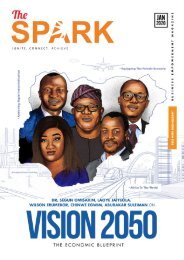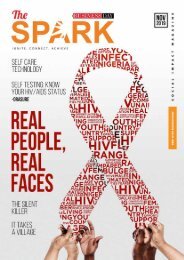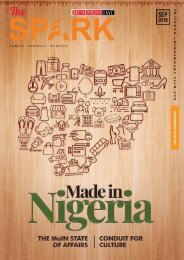You also want an ePaper? Increase the reach of your titles
YUMPU automatically turns print PDFs into web optimized ePapers that Google loves.
The Spark | Ignite / Connect / Achieve<br />
www.thesparkng.com<br />
BOTTOMLINE<br />
Meeting The Tax Man<br />
“In this world nothing can be said to be certain, except death<br />
and taxes” – Benjamin Franklin.<br />
By Asiata Atinuke<br />
Agboluaje<br />
“The 2019 DBI ranking for paying taxes<br />
indicates that it is now easier to pay taxes<br />
in Nigeria than it is in at least 33 other<br />
countries/territories in the world, as<br />
opposed to just 8 countries in 2017. “<br />
The above quote still rings true<br />
today as it did over 200 years<br />
ago when it was originally written,<br />
despite the expansiveness of tax<br />
provisions and increased enforcement<br />
initiatives. Considering the certainty<br />
of tax payment, the reality is that ease<br />
of compliance (covering time taken to<br />
comply, frequency of payment, number<br />
of taxes, waiting time, convenience and<br />
cost) contributes to how easy it is to do<br />
business in any economy.<br />
The Nigerian government, committed<br />
to enhancing the country’s business<br />
environment and competitiveness, set<br />
up the Presidential Enabling <strong>Business</strong><br />
Environment Council (PEBEC) in 2016.<br />
Led by the Vice President, PEBEC’s objectives<br />
are to reduce the time, procedures<br />
and cost for setting up and doing<br />
business in Nigeria, thus improving the<br />
ease of doing business in Nigeria.<br />
The contribution of an effective tax<br />
compliance framework to an improved<br />
business environment is recognised<br />
by the World Bank in its annual report<br />
(The Report) on ease of doing business,<br />
covering 190 economies including<br />
Nigeria, and focusing on certain key indicators<br />
which include “Ease of Paying<br />
Taxes”.<br />
Over the past three years, Nigeria has<br />
fared arguably well under this indicator,<br />
moving up by 25 places. The 2019 DBI<br />
ranking on paying taxes indicates that<br />
it is now easier to pay taxes in Nigeria<br />
than it is in at least 33 other countries/<br />
territories in the world, as opposed to<br />
just 8 countries in 2017.<br />
Ease of paying taxes 2017 2018 2019<br />
Global ranking 182/190 171/190 157/190<br />
Ranking in<br />
Sub-Saharan Africa<br />
Source: 2019 World Bank Ease of Doing <strong>Business</strong> report<br />
Nigeria’s improved ranking in paying<br />
taxes is attributable to, amongst other<br />
things, reforms pushed by PEBEC,<br />
aimed primarily at simplifying tax payment,<br />
tax compliance and tax administration<br />
in Nigeria by leveraging technology.<br />
These reforms were implemented<br />
in collaboration with tax authorities<br />
such as Federal Inland Revenue Service<br />
(FIRS) and the Internal Revenue Service<br />
of some states. Key highlights of<br />
the reforms are set out below:<br />
a) Automatic creation of Tax Identification<br />
Number (TIN) upon incorporation<br />
of companies<br />
All Nigerian companies are required to<br />
register for taxes and obtain a unique<br />
TIN. PEBEC’s reform on ease of setting<br />
up businesses resulted in a collaboration<br />
between the Corporate Affairs<br />
Commission and Federal Inland Revenue<br />
Service. With this collaboration,<br />
newly incorporated companies are automatically<br />
registered for taxes, doing<br />
away with the erstwhile manual process.<br />
42/48 35/48 28/48<br />
Automatic generation of TIN improves<br />
the timeliness of obtaining other permits<br />
as TIN is usually a prerequisite<br />
for opening bank accounts to ease the<br />
ability to inflow capital and commence<br />
business, as well as for compliance with<br />
other tax obligations such as Value<br />
Added Tax, with the attendant probability<br />
of increased tax revenue.<br />
b) E-filing platforms and the simplified<br />
interface<br />
Online platforms have been introduced<br />
for rendering a number of electronic<br />
tax services, which were hitherto<br />
completed via manual processes. This<br />
is coupled with a simplified schedule<br />
dealing with various tax types.<br />
With the introduction of the electronic<br />
services, taxpayers can now register<br />
for taxes, make tax payments (covering<br />
all tax types), file tax returns, generate<br />
tax receipts and obtain tax clearance<br />
certificates (TCC) electronically, from<br />
the comfort of their offices, without<br />
having to be physically present at tax<br />
offices.<br />
This has reduced the stress hitherto associated<br />
with the manual nature of tax<br />
compliance. It has increased the speed<br />
with which tax can be administered,<br />
while reducing the cost as well. Another<br />
inherent benefit in this reform is<br />
the increased transparency, which has<br />
the propensity to enhance the culture<br />
of voluntary compliance amongst taxpayers.<br />
c) Regular stakeholder engagement<br />
Recognising that feedback and stakeholder<br />
engagement are two of the<br />
12 @the<br />
sp<br />
ark<br />
ng

















